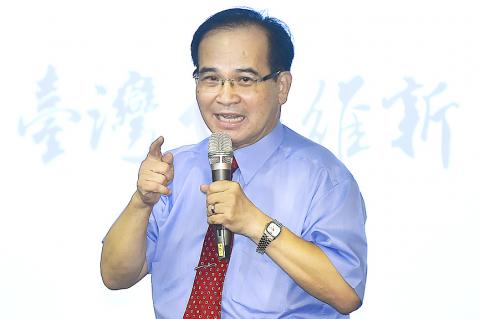The Taiwan Renewal Party (台灣維新黨) was formally founded yesterday, announcing aims to restrict the central government’s power and reform taxation.
The party would push for a tax-sharing system similar to that introduced by Germany and later adopted by China, Taiwan Renewal Party convener Su Huan-chih (蘇煥智) told a news conference in Taipei to mark the party’s founding.
Local governments would ideally receive half of profit-seeking enterprises’ income tax and business tax — which currently go to the central government — allowing them to promote more policies and developments, Su said.

Photo: Chen Chih-chu, Taipei Times
This would incentivize local governments to attract investment, thereby boosting local economies, said Su, a former Tainan County commissioner who left the Democratic Progressive Party (DPP) in March last year.
The Taiwan Renewal Party would seek to restrict the central government’s jurisdiction and give local governments more autonomy, he said.
For instance, the six special municipalities could hold district director elections and allow each district to have more say on its own affairs, rather than have the mayor distributing all the resources, he said.
National affairs are decided by a handful of policymakers and young people often feel powerless and depressed, as they are not given the opportunity to use their talent to benefit the nation, he said, adding that if a proportional representation system were adopted for local elections, capable young people would be more motivated to enter politics.
The party would nominate at least 10 candidates for next year’s legislative elections, Su said.
He said that he did not form the party in pursuit of power or profit, but to reform the nation.
President Tsai Ing-wen (蔡英文) during her first presidential campaign in 2012 raised the idea of a “Taiwan consensus,” but did not define what she meant by “consensus,” he said.
The consensus is that Taiwan, or the Republic of China (ROC), is an independent nation, the future of which should be decided by its 23 million people, he said.
More than 80 percent of Taiwanese accept either the ROC or Taiwan when referring to the nation, so people should not dwell on the matter, he said.
Most people care about how the economy can be reinvigorated and how underprivileged people can be cared for, Su said, adding that he and Hon Hai Precision Industry Co founder Terry Gou (郭台銘) think similarly in this regard.
Asked if he would support Gou if he ran for president, Su said that he welcomes all like-minded candidates.
The Taiwan Renewal Party’s ideals partially align with Gou’s, as he also wants to restore the ROC’s glory and find an answer to people’s frustrations, Tsai Chin-yu (蔡沁瑜), deputy chief executive of Gou’s Yonglin Foundation, said at the event.
Asked whether his party supports Tsai’s re-election bid, Su said: “We are just small potatoes, so does it matter?”

Taiwanese can file complaints with the Tourism Administration to report travel agencies if their activities caused termination of a person’s citizenship, Mainland Affairs Council Minister Chiu Chui-cheng (邱垂正) said yesterday, after a podcaster highlighted a case in which a person’s citizenship was canceled for receiving a single-use Chinese passport to enter Russia. The council is aware of incidents in which people who signed up through Chinese travel agencies for tours of Russia were told they could obtain Russian visas and fast-track border clearance, Chiu told reporters on the sidelines of an event in Taipei. However, the travel agencies actually applied

New measures aimed at making Taiwan more attractive to foreign professionals came into effect this month, the National Development Council said yesterday. Among the changes, international students at Taiwanese universities would be able to work in Taiwan without a work permit in the two years after they graduate, explainer materials provided by the council said. In addition, foreign nationals who graduated from one of the world’s top 200 universities within the past five years can also apply for a two-year open work permit. Previously, those graduates would have needed to apply for a work permit using point-based criteria or have a Taiwanese company

The Shilin District Prosecutors’ Office yesterday indicted two Taiwanese and issued a wanted notice for Pete Liu (劉作虎), founder of Shenzhen-based smartphone manufacturer OnePlus Technology Co (萬普拉斯科技), for allegedly contravening the Act Governing Relations Between the People of the Taiwan Area and the Mainland Area (臺灣地區與大陸地區人民關係條例) by poaching 70 engineers in Taiwan. Liu allegedly traveled to Taiwan at the end of 2014 and met with a Taiwanese man surnamed Lin (林) to discuss establishing a mobile software research and development (R&D) team in Taiwan, prosecutors said. Without approval from the government, Lin, following Liu’s instructions, recruited more than 70 software

Chinese spouse and influencer Guan Guan’s (關關) residency permit has been revoked for repeatedly posting pro-China videos that threaten national security, the National Immigration Agency confirmed today. Guan Guan has said many controversial statements in her videos posted to Douyin (抖音), including “the red flag will soon be painted all over Taiwan” and “Taiwan is an inseparable part of China,” and expressing hope for expedited reunification. The agency last year received multiple reports alleging that Guan Guan had advocated for armed reunification. After verifying the reports, the agency last month issued a notice requiring her to appear and explain her actions. Guan